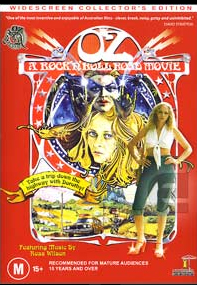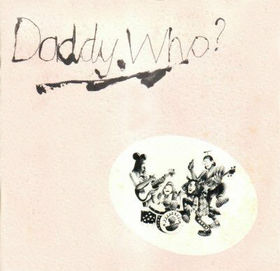Related Research Articles
Spectrum are an Australian progressive rock band which formed in April 1969 and broke up in April 1973. The original line-up was Mark Kennedy on drums, Lee Neale on organ (ex-Nineteen87), Bill Putt on bass guitar, and Mike Rudd on guitar and lead vocals. In August 1970 Kennedy was replaced by Ray Arnott on drums. These members also performed under the alter ego, Indelible Murtceps, from 1971 to 1973. Spectrum had a number-one hit, "I'll Be Gone", on the Go-Set National Top 60 singles chart. After Spectrum and Indelible Murtceps disbanded, Putt and Rudd formed Ariel. In 1999 the pair formed Spectrum Plays the Blues, which later trimmed their name back to Spectrum. On 7 August 2013 Bill Putt died, after a heart attack.
Pat Wilson is an Australian singer and journalist. Wilson wrote for Go-Set, a 1960s and 1970s pop music newspaper, under the pen-name "Mummy Cool" during 1971–1972. Wilson released several singles in the early 1980s including the hit single "Bop Girl". The song was written by her then husband Ross Wilson of the bands Daddy Cool and Mondo Rock. Pat currently resides in the Melbourne suburb of Elwood.

Ross Andrew Wilson is an Australian singer-songwriter, musician and producer. He is the co-founder and frontman of the long-standing rock groups Daddy Cool and Mondo Rock, as well as a number of other former bands, in addition to performing solo. He has produced records for bands such as Skyhooks and Jo Jo Zep & the Falcons, as well as for those of his own bands. He appeared as a judge on celebrity singing TV series It Takes Two from 2005. Wilson was individually inducted into the Australian Recording Industry Association (ARIA) Hall of Fame in 1989 and again as a member of Daddy Cool in 2006. Ross currently resides in the Melbourne suburb of Port Melbourne.

"Eagle Rock" is the debut single by Australian rock band Daddy Cool, released in 1971 on the Sparmac record label. It went on to become the best-selling Australian single of the year, achieving gold status in eleven weeks, and remaining at No. 1 on the national charts for a (then) record ten weeks. "Eagle Rock" also spent 17 weeks at the No. 1 spot on the Melbourne Top 40 Singles Chart. The song was re-released by Wizard Records in 1982, and reached No. 17 on the Australian singles chart.
The Pink Finks were an Australian pop/R&B band of the mid-1960s. Based in Melbourne, the group is most notable for being the first in the series of bands that featured Ross Wilson and Ross Hannaford, which culminated in the hugely successful Daddy Cool.

Procession were an Australian psychedelic band formed in Melbourne in 1967. The band was composed of drummer Craig Collinge, organist Trevor Griffin, bassist/vocalist Brian Peacock, and guitarist/vocalist Mick Rogers, all members of previous bands. They were described by Glenn A. Baker as one of the most ambitious bands in the Australian music scene in their time, in spite of a lack of commercial success. They were regularly championed in Go-Set magazine and had their own segment on music TV show Uptight, of which their manager was the producer.

"I'll Be Gone" or "Some Day I'll Have Money" is a song by Australian progressive rock group Spectrum released as their debut single by EMI on Harvest Records in January 1971. It peaked at #1 on the national singles chart, while it reached Top 5 in Melbourne, Sydney and Brisbane. The song was written by guitarist and vocalist Mike Rudd, and produced by Howard Gable. The B-side, "Launching Place Part Two" was written to promote a music festival. Spectrum never repeated the success of "I'll Be Gone".

Ross Andrew Hannaford was an Australian musician, active in numerous local bands. He was often referred to by his nickname "Hanna". Widely regarded as one of the country's finest rock guitarists, he was best known for his long collaboration with singer-songwriter Ross Wilson, which began as teenagers, with The Pink Finks and forming the seminal early '70s Australian rock band Daddy Cool. Hannaford died of cancer after being diagnosed a year earlier.

Oz is a 1976 Australian film written, directed and co-produced by Chris Löfvén. It stars Joy Dunstan, Graham Matters, Bruce Spence, Gary Waddell, and Robin Ramsay; and received four nominations at the 1977 AFI Awards. The musical score is by Ross Wilson. The plot is a re-imagining of the 1939 The Wizard of Oz film transferred to 1970s Australia and aimed at an older teen / young adult audience. It was released on DVD in 2004 as Oz - A Rock 'n' Roll Road Movie : Collector's Edition with additional material. The poster and album sleeve for the American release was done by rock artist Jim Evans.
Gary Young is an American-born Australian musician who was a founding member of Australian rock band Daddy Cool in which he played the drums and sang backing vocals. He also played drums with Jo Jo Zep & The Falcons amongst other bands. Young was twice inducted into the Aria Hall of Fame as a member of both Daddy Cool and Jo Jo Zep & The Falcons which were inducted into the Australian Recording Industry Association (ARIA) Hall of Fame in 2006 and 2007 respectively.

Daddy Who?... Daddy Cool is the 1971 debut album by Australian rock band Daddy Cool.
Daddy Cool is an Australian rock band formed in Melbourne, Victoria in 1970 with the original line-up of Wayne Duncan, Ross Hannaford, Ross Wilson and Gary Young. Their debut single "Eagle Rock" was released in May 1971 and stayed at number 1 on the Australian singles chart for ten weeks. Their debut July 1971 LP Daddy Who? Daddy Cool also reached number 1 and became the first Australian album to sell more than 100,000 copies. The group's name came from the 1957 song "Daddy Cool" by US rock group The Rays. Daddy Cool included their version of this song on Daddy Who? Daddy Cool.
"Daddy Cool" is a song by US doo-wop group The Rays and was released on Cameo Records as the B-side of their 1957 single "Silhouettes". It became a No. 3 hit on the Billboard Pop singles chart. The song was written by Bob Crewe and Frank Slay, who had also written the A-side, "Silhouettes". The song became a No. 1 single on the Australian singles charts when covered by novelty band Drummond in 1971, and remained there for seven weeks. UK cover band Darts also had a hit single with the song, which reached No. 6 in 1977.
Mighty Kong were an Australian 'supergroup' successor to Daddy Cool, which broke up in August 1972. It was also the fifth in the line of groups that featured singer-songwriter Ross Wilson and guitarist Ross Hannaford, which began with Pink Finks in 1965. Despite its all-star line-up, drawing from three of the top groups of the time, the band was short-lived and never really achieved its considerable potential, effectively relegated to being a footnote in the story of Daddy Cool.

The New Cool is the third studio album, by Australian rock band Daddy Cool. It was released in November 2006, thirty-four years after the release of their previous studio album, Sex, Dope, Rock'n'Roll: Teenage Heaven.
Peter Stuart Robert Marin is an Australian drummer and percussionist. Marin joined Dan Sultan's backing band in 2006 and is recorded on Sultan's albums, Get Out While You Can, Blackbird and Killer. He provided drums and percussion on United Kingdom artist, Passenger's albums, Whispers, Whispers II, Young as the Morning, Old as the Sea, Runaway and Songs for the Drunk and Broken Hearted.
Cam-Pact was an Australian soul and psychedelic pop band which formed in April 1967. Originally they performed as The Camp Act but soon changed to Cam-Pact. Although little known outside Melbourne at the time, the various lineups of the group featured a number of young Melbourne musicians who went on to become significant figures on the Australian music scene, including Ray Arnott, Keith Glass, Chris Löfvén, Russell Smith, Robert Lloyd, and Chris Stockley. Cam-Pact issued five singles and three extended plays on Festival Records before disbanding in March 1970.
Kevin Gullifer Hopkins-Smith, who performed as Little Gulliver and Gulliver Smith, was an Australian singer and songwriter from the early 1960s to mid-2000s. He was the front man and founding mainstay vocalist of Company Caine. In 1976 he and Ross Wilson co-wrote "A Touch of Paradise" for Wilson's group, Mondo Rock, which appeared on their third album, Nuovo Mondo. It was covered by John Farnham on his album, Whispering Jack, and was issued as its third single in February 1987, which reached the top 30 on the Kent Music Report Singles Chart.
Wayne Ian Duncan was an Australian rock musician. In 1970 he was a founding member of the doo-wop band, Daddy Cool, providing bass guitar and backing vocals. They were inducted into the ARIA Hall of Fame in 2006. During his career he had also been a member of the Rondells, Sons of the Vegetal Mother, Gary Young's Hot Dog, Jane Clifton and the Go Go Boys, the Black Sorrows, and the Hornets. In late November 2016 Duncan had a stroke and died a week later, he was survived by his domestic partner, Anne, and by two children. According to Australian music journalist, Ian McFarlane, "Duncan was never a sedate bassist. One only has to listen to some of the latter-day DC material... to hear how inventive his playing could be."
"Come Back Again" is an Australian rock song, released by Daddy Cool in September 1971 on the Sparmac record label. It reached number 3 in the Australian charts.
References
- 1 2 3 "Sons of the Vegetal Mother". Milesago. Retrieved 12 May 2008.
- 1 2 Kent, David (1993). Australian Chart Book 1970–1992 . St Ives, N.S.W.: Australian Chart Book. ISBN 0-646-11917-6. NOTE: Used for Australian Singles and Albums charting from 1970 until ARIA created their own charts in mid-1988.
- 1 2 3 4 Holmgren, Magnus. "Daddy Cool". Australian Rock Database. Passagen.se (Magnus Holmgren). Archived from the original on 22 October 2013. Retrieved 22 March 2014.
- ↑ "Ross Wilson on Saturday Night Country". ABC Radio. 28 May 2003. Retrieved 13 May 2008.